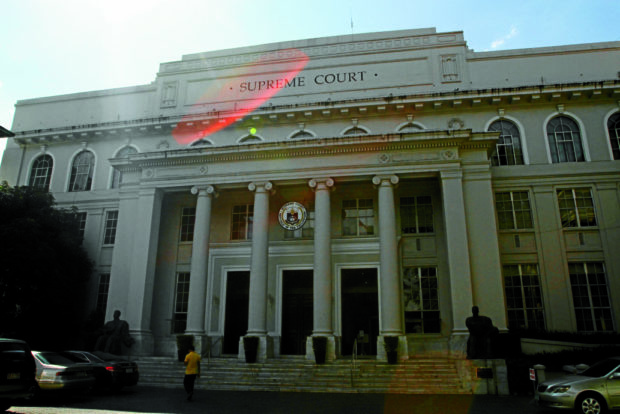
INQUIRER PHOTO / RICHARD A. REYES
The 1987 Constitution has enough guarantees to thwart the possible abuse of the presidential prerogative to declare martial law and suspend the privilege of the writ of habeas corpus, according to the Supreme Court.
But the tribunal, voting 11-3-1, recognized President Duterte’s “sole discretion” to expand the geographical scope of his martial law proclamation beyond the place where an actual rebellion was happening to prevent the armed uprising from “spilling over.”
In dismissing the three petitions questioning Mr. Duterte’s Proclamation No. 216, the high court said in its decision on Tuesday that the attack by the Islamic State-inspired Maute terror group in Marawi City on May 23 was an act of rebellion, which justified the imposition of military rule all over Mindanao.
Theodore Te, the high court’s spokesperson, said the President’s authority to invoke martial law, as spelled out in Section 18, Article VII of the Constitution, was not without limits.
In fact, Te said, the tribunal “exercised one of those limits” when it deliberated on the petitions and reviewed the President’s martial law declaration.
Wide latitude
Retired Supreme Court Associate Justice Adolf Azcuna said while the magistrates gave the President a “wide latitude,” it did not rule that his powers to impose martial law was unlimited.
“The 11 justices did not say there’s no limit to President’s martial law powers, but rather upheld the declaration precisely because there are constitutional safeguards in place against abuses,” Azcuna said.
“The review conducted by the Supreme Court of the sufficiency of the factual basis of the proclamation is itself one of the limits of that power,” he said.
The magistrates allayed the fears of those opposed to martial law, saying the 30-year-old charter had enough safeguards to prevent Mr. Duterte from abusing his power.
“The importance of martial law in the context of our society should outweigh one’s prejudices and apprehensions against it. The significance of martial law should not be undermined by unjustified fears and past experience,” said the court’s 82-page ruling.
The tribunal also asserted its jurisdiction to scrutinize and strike down any martial law declaration, saying Section 18, Article VII of the Constitution “specifically grants authority to the court to determine the sufficiency of the factual basis of the proclamation.”
‘Most important objective’
It said the “most important objective” of that provision was “the curtailment of the extent of powers of the Commander in Chief.”
That provision also gives “additional safeguard against possible abuse by the President” of his power to impose martial law, the court said.
The court explained that it was “difficult if not impossible, to fix the territorial scope of martial law in direct proportion to the ‘range’ of actual rebellion and public safety simply because rebellion and public safety have no fixed physical dimensions.”
The territorial scope of martial law “could only be drawn from arbitrary, not fixed, variables,” it said. “The Constitution must have considered these limitations when it granted the President wide leeway and flexibility in determining the territorial scope of martial law.”
“There is no constitutional edict that martial law should be confined only in the particular place where the armed public uprising actually transpired. This is not only practical but also logical,” it said.
As the end of 60-day martial law period on July 22 drew closer, Senate President Aquilino Pimentel III on Friday said that the President must request Congress for any extension.
Pimentel said he agreed with Senate Minority Leader Franklin Drilon, who said only Congress, not Mr. Duterte, can extend martial law. —WITH REPORTS FROM JEROME ANING AND JOCELYN R. UY